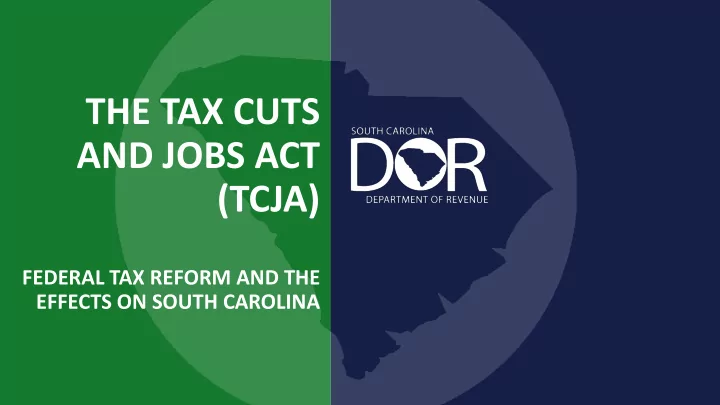

THE TAX CUTS AND JOBS ACT (TCJA) FEDERAL TAX REFORM AND THE EFFECTS ON SOUTH CAROLINA
New Federal Law Highlights Highlights of f the new law • Congress passed the Tax Cuts and Jobs Act in December 2017 • Serves as the largest major tax reform in over 30 years • Effective beginning with Tax Year 2018 (tax returns due Spring 2019) • Dramatically changes taxation of individual taxpayers and businesses
Highlights of f Specific Changes • Increased Standard Deduction • Combined personal exemption and standard deduction into a “new” increased deduction - $24,000 for joint return • Expanded use of 529 Account Funds • Allows withdrawal of tuition payments for elementary or secondary schools • Section 179 Expensing • Depreciable tangible personal property expensed up to $1M from $500k • Net Operating Loss Reduction Carryforward • Carryforward indefinitely (previously 20 years) • IRC Section 199A (pass-through entities) • 20% deduction of qualified business income for partnerships, s- corporations and sole proprietorships
In Individual In Income Tax Highlights • New income brackets and tax rates – 37% highest tax rate • Repealed personal exemptions - $4,050 • Increased the standard deduction – up to $24,000 • Decreased the limit on annual mortgage interest deduction - $750k and eliminated interest deduction on home equity loans • Limited State and Local Tax deduction to $10,000 • 20% deduction for pass-through entities • Expanded use of 529 Account Funds • Repeal of moving expenses and alimony deductions • More generous child tax credits ($1,000 to $2,000/child)
Corporate In Income Tax Highlights • Permanently reduced the Corporate tax rate to 21% • Repeals Corporate alternative minimum tax • Imposes new limits on business interest deductions (30%) • Changes to Section 179 expensing and bonus depreciation • Net operating loss deduction carryforward
Overview of f SC Tax Principles Highlights of f the new law • Federal taxable income is the starting point for SC taxpayers • Elections made for federal income tax purposes automatically apply for SC income tax purposes • Federal principles of accounting, filing requirements, and a taxpayer’s tax year are used for SC income tax purposes
Overview of f Conformity Highlights of f the new law • Historically, SC has conformed to the federal tax code with limited modifications since 1985 • Conformity simplifies the filing of returns since the starting point is federal taxable income • Keeps filing simple and maximizes compliance
Benefits of f Nonconformity Allows Additional Time • Allows SC additional time to consider the effects of the new federal tax laws • The IRS is in the process of providing guidance • The full impact on SC is unknown at this time
Consequences of f Nonconformity Results in a Complex Tax System • By not conforming, SC’s tax system will go from one of the simplest to one of the most complex in the US • SC taxpayers will be “stuck” in time relying on 2016 federal tax laws • Other states will continue to partner with the federal government, utilizing federal tax changes to their benefit
Consequences of f Nonconformity SC taxpayers will be required to have a working knowledge of 2 sets of federal laws • A federal return using 2017 federal tax laws • A SC return using 2016 federal tax laws • No longer can SC taxpayers use their federal taxable income as a starting point for their SC return • Recalculate current federal taxable income to comply with 2016 federal tax laws • This will require the taxpayers to make up to 30 adjustments - just to begin their SC return!
Consequences of f Nonconformity • SC taxpayers can no longer utilize IRS guidance to complete their SC tax return • Preparation costs may increase due to complexity of SC tax system • Software providers may not support all SC forms and schedules – possible filing delays, reduction in electronic filing • SCDOR no longer able to utilize federal audit data to ensure compliance and collections • Possible chilling effect on economic development
Conclusion Results of Nonconformity Increase in Decrease in Tax Decrease in Tax = + Complexity Compliance Collections
Recommendations Tax Conformity vs Nonconformity SCDOR recommends conforming (with modifications) to offset any tax increase resulting from federal tax reform
List of f Potential Modifications Tax Conformity vs Nonconformity • Restore personal exemptions • Restore under age 6 exemption • Reduce income tax rates • Restore itemized deductions • Miscellaneous – tax prep fees, employee business expenses, investment management fees • Property taxes over $10,000 • Interest on home equity line of credit • Increase SC’s two wage earner credit • Increase SC’s retirement income deduction for persons 65+
Hartley Powell Deana West Meredith Cleland South Carolina Department of Revenue Division P.O. Box 125 Columbia, SC 29214 dor.sc.gov /dor.sc.gov @scdor
Recommend
More recommend